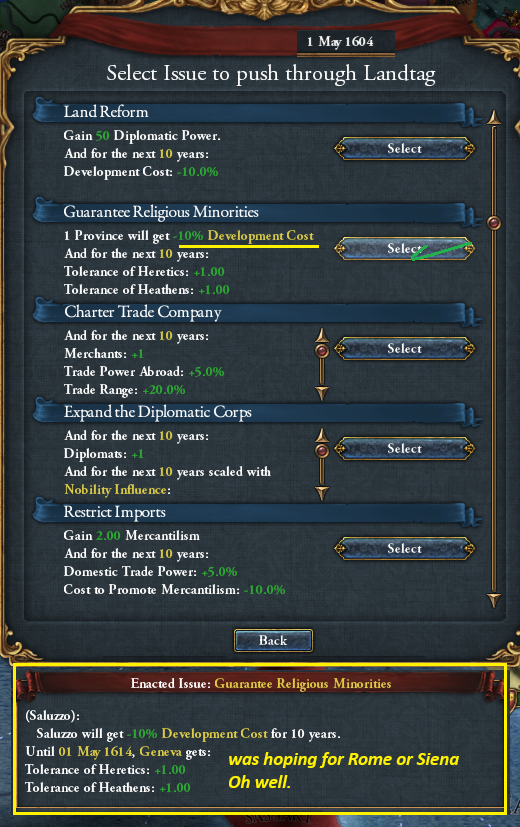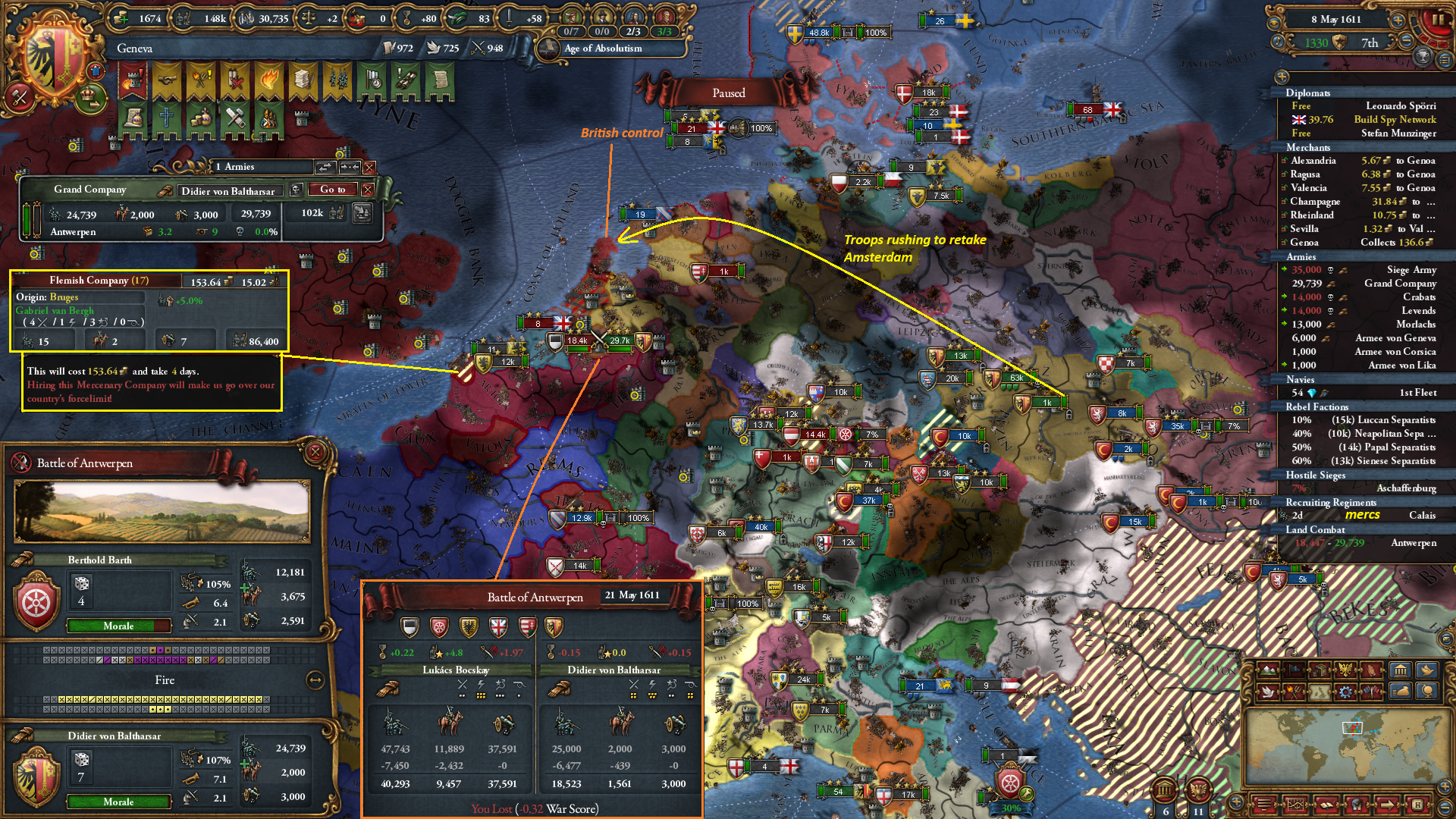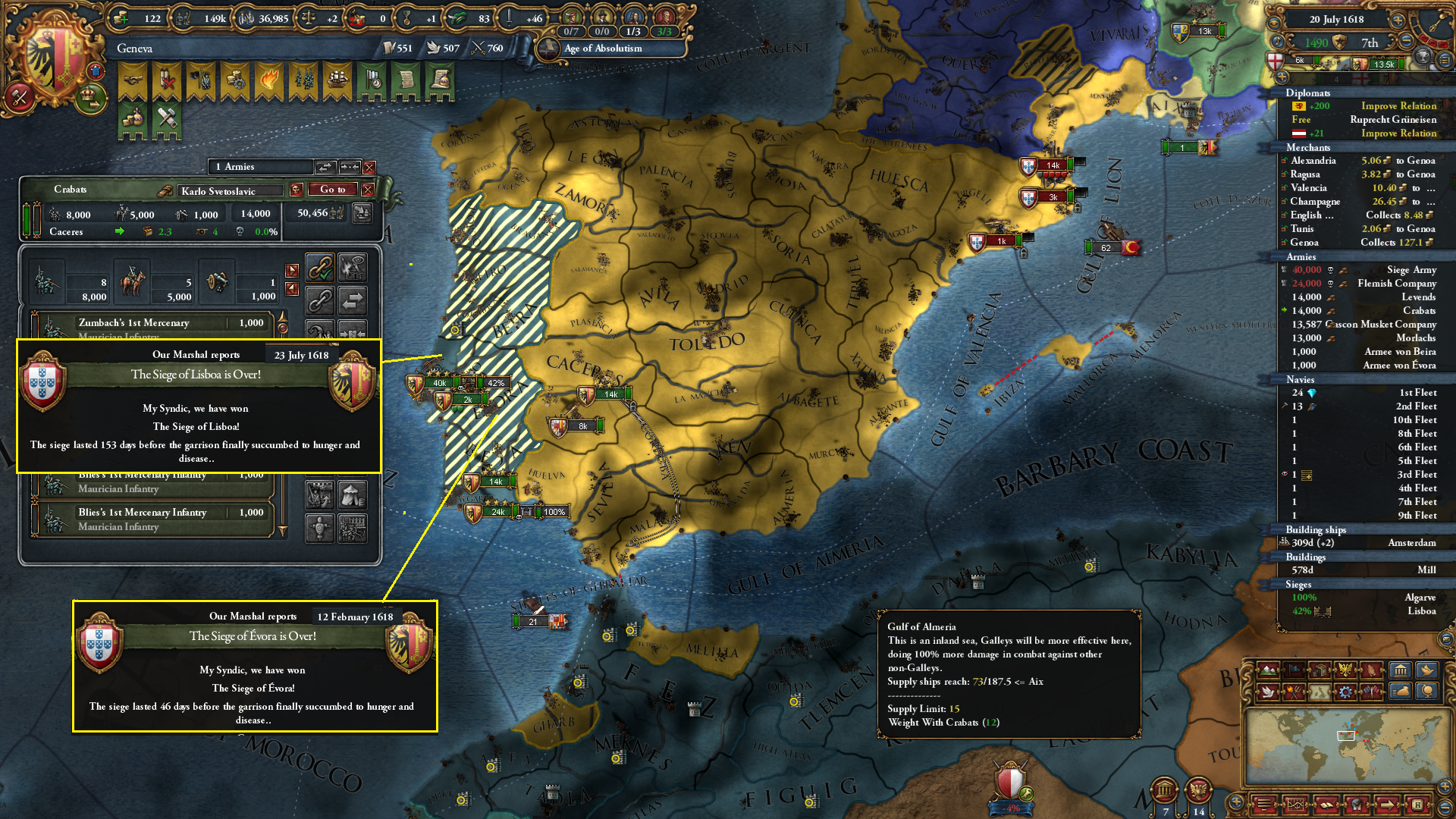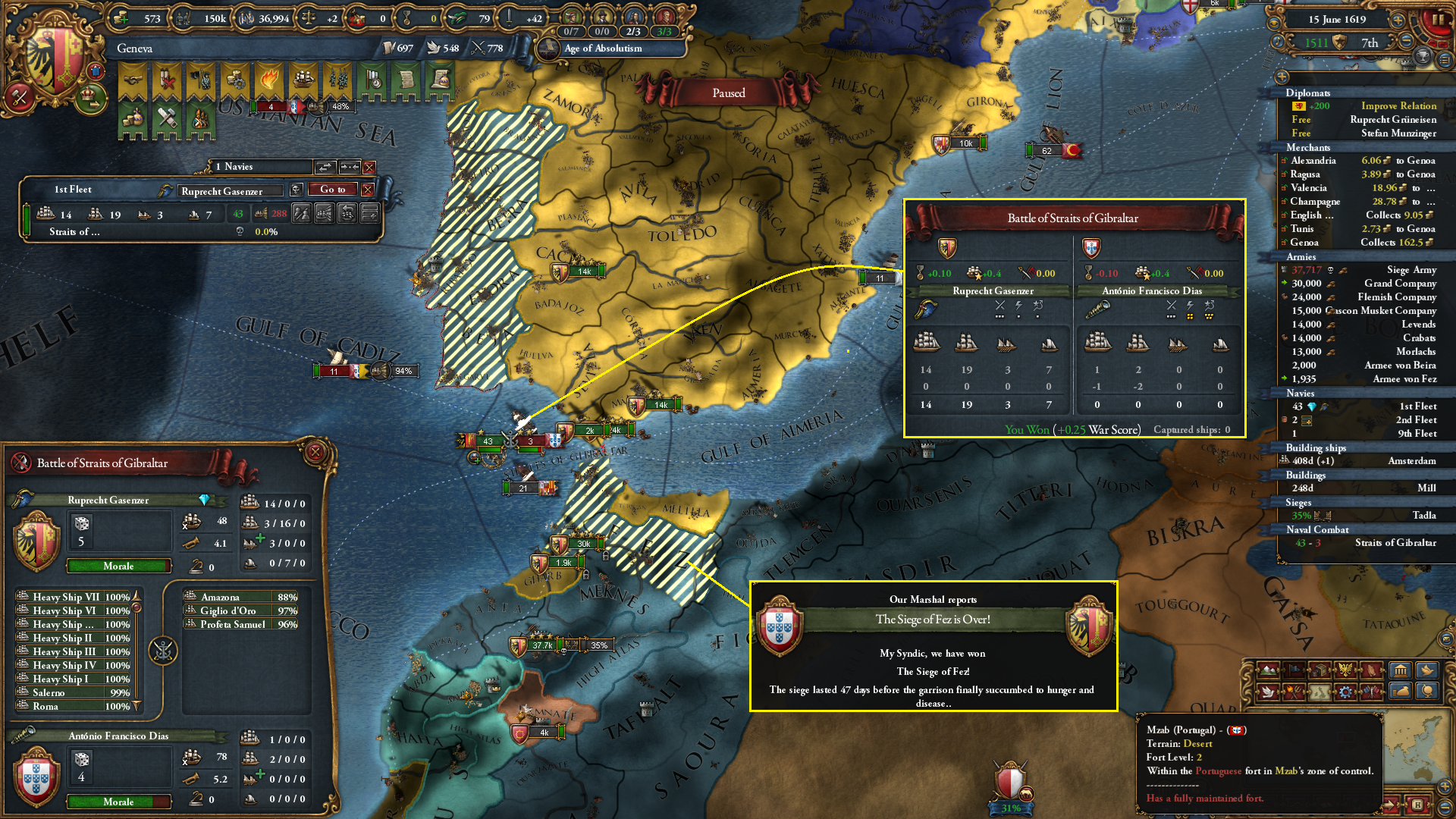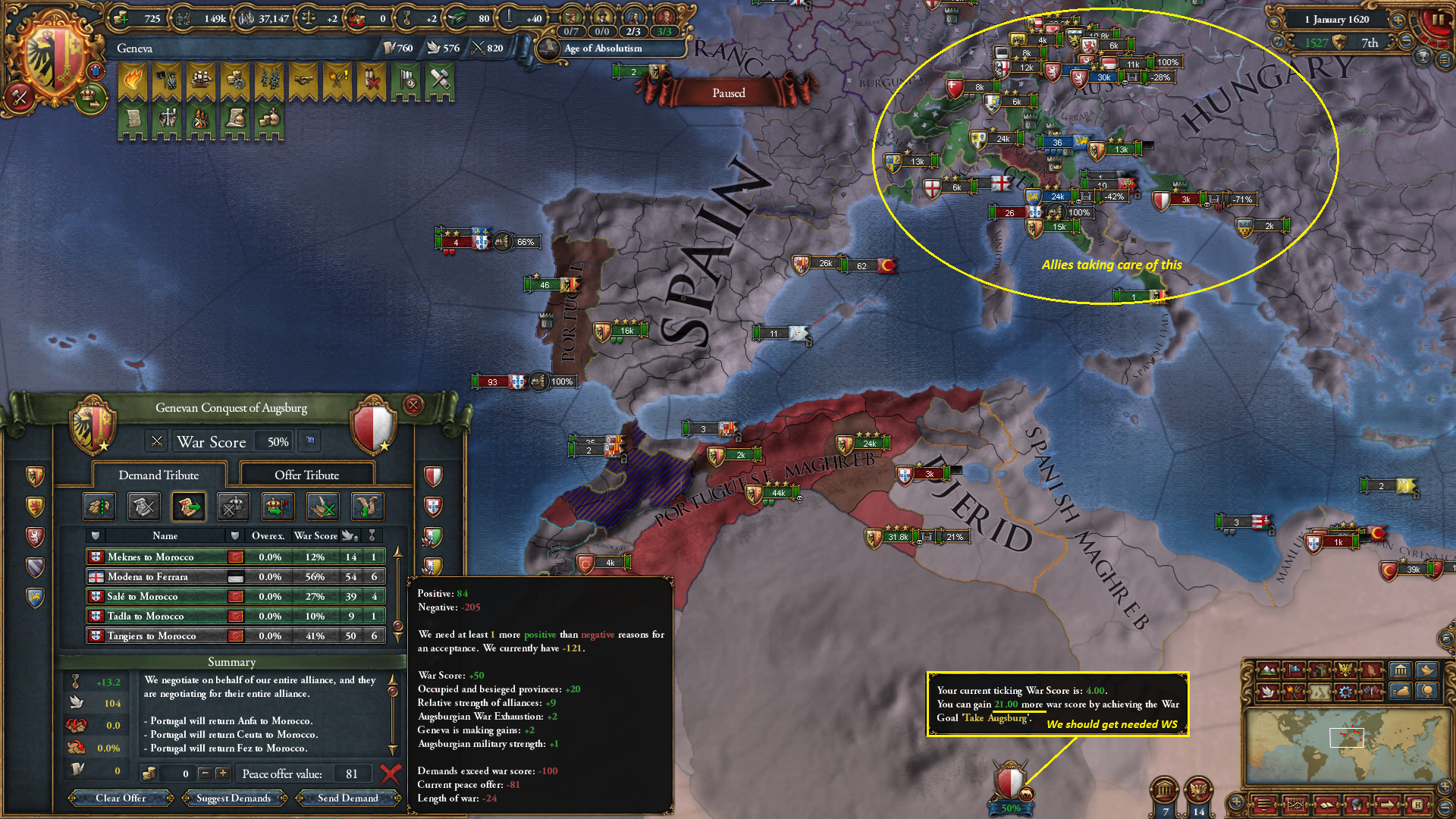Chapter 16: The Calvinist Connection (1610-1620)
We ended the last chapter with Geneva waging an indirect war on Great Britain via their ally-of-ally Mainz. One the main aims of that war was to have Britain cede the important province of Amsterdam to Friesland. To make sure that aim was actually achievable, Syndic von Baltharsar ordered the Genevan army to transfer occupation of said city to Friesland as early as possible. He then sent feelers just to test out Friesland's willingness to take the province. To his dismay, and as predicted by international observers ( h/t
@Steckie ), Friesland did not want that province

.
That angered the Syndic who started to regard the Frisians with contempt. And with now Friesland occupying the province, he had no options of annexing it outright in an eventual peace. Geneva needed to reoccupy the province, and that meant letting it fall back into British hands first. So he ordered the army operating in the Netherlands to withdraw back towards Switzerland region . And he had the Genevan armies focus on occupying as much of Hungary as possible
The poor Hungarians were at that point getting squeezed between the Genevans advancing from the Adriatic, the Ottomans advancing from the South and the Swedes from the North.
Meanwhile on the Western front, the British landed a fresh army in the Netherlands and began sieging the cities of Friesland. The Syndic ordered the Genevan army to avoid contact with the British there, and directed it instead to invest the city of Calais which fell in January 1611.
Once the British took the Frisian city of Den Haag they quickly reoccupied Amsterdam. That was the signal for the Syndic to order the Genevan armies to hurry from Hungary to the Netherlands. At the same time, the army in Calais was ordered to relieve the siege of Antwerpen, while a new mercenary company, the Flemish Company, was recruited in occupied Calais as reinforcement ( the ability to recruit mercenaries in occupied provinces is a tactic that Geneva would use again in this Chapter in much more critical situations).
Unfortunately the battle of Antwerp was a defeat for Geneva and her army was forced to withdraw to Calais. To help with focusing the war effort on the Netherlands theatre, the Syndic decided this was a good time to force Hungary out of the war . With Pest and most Hungarian provinces in the hands of Geneva and her allies, the Hungarian King was forced to submit to a difficult peace which saw Geneva's allies Bohemia and Venice regain territory at his expense

The Syndic could have chosen to continue the occupation of Hungary longer and try and get them to cede more land to his allies, but he did not want to weaken Hungary too much. Although an official rival of Geneva, the Hungarians played an important role in preventing expansion of the huge Polish or Ottoman Empires in Eastern Europe. You see, Hungary was allied to France and guaranteed by Poland . This effectively deterred an Ottoman attack . But a very weak Hungary could tempt Poland into revoking the guarantee which would break the uneasy tense peace that was in place.
But one unforeseen and unfortunate side effect of the Hungarian peace was the designation of many Genevan army units traveling to the Netherlands as "exiled" and out of combat , as they were traversing neutral territory . As a result, when the Genevan armies reached Amsterdam, only the Morlachs company was capable of combat . The waiting British army had no difficulty dispatching them in battle.
Luckily the Genevans were able to hold Calais against a British attack , and were thus able to rehabilitate the exiled troops in Calais and avoid the long term trek to South Germany . The regrouped Genevan force then took the offensive, supported by friendly Ottomans units nearby . Their immediate target was the liberation of the Frisian city of Den Haag which blocked the road to Amsterdam.
But just as Den Haag was about to fall , the Frisians decided to make peace with the enemy, dooming the Genevan armies to another round of exile.
If the Syndic was already annoyed with the Frisians at their refusal to accept Amsterdam, he was now

livid

at their interference with the war effort .And what made him angrier at the delay caused by the Frisian peace was the fact that Spain had just declared another war on France, this time with the help of their ally Portugal ( the Iberian alliance broken by von Hasseln previously had apparently been reinstated).
The Syndic hoped that France. with the help of her allies , would be able to hold off the Iberians until Geneva finishes her war . But while his attention was focused on these events, the British managed a surprise landing in Sardinia . It was only the destruction of a sentinel unit left there that alerted the Syndic to the problem
Since Corsica was one of the main war aims, the Syndic did not want to see it lost . With the British fleet blocking reinforcements to the island, Geneva again resorted to mercenaries and the Free Company was raised in Corsica, using local volunteers apparently. But to give time for the mercenaries to become combat ready , the fleet was ordered out of the safety of Lucca to challenge the British navy
The outcome of the second battle of the Ligurian sea was similar to the first. The Genevan navy held its own for several days and withdrew in good order, dishing out as well as it received. And while the battle was a technical defeat, it was a
de facto victory as the British navy withdrew back to the Atlantic to refit. That left the British expeditionary force in Sardinia stranded , and allowed time for he mercenaries in Corsica to prepare for battle. And instead of the British taking Corsica, it was the Genevans who took Sardinia and destroyed the expeditionary force
At that point the war was effectively over. The Archbishop of Mainz, officially the war leader of the enemy alliance, was willing to force the British to part with Amsterdam , Calais and Corsica. But the Syndic wanted to completely kick the British out of their mainland ports . So he kept the war going, to put more pressure on the enemy
And to convince the enemy of their utter defeat, various British armies that were stranded in Europe were chased and destroyed over the next 18 months .




By October 1613, the enemy alliance was willing to cede all 4 British port on the mainland ( Calais, Amsterdam, Corsica and Sassari) to Geneva. There was no compelling reason for Geneva to annex all 4 , an action that would have triggered a hostile coalition . And many expected the Syndic to annex Corsica to Geneva as the "province of the decade" , and release Amsterdam as the free nation of Holland and Sassari as the free nation of Sardinia, leaving Calais to be sold to a 3rd party. But the Syndic had other ideas. For starters, he did not trust that Amsterdam under a free Holland would not fall back into British hands, and he really wanted to keep both Calais and Amsterdam, important centers of trade in the Channel, out of British hands. So he decided to have Sardinia released as a free nation out of Sassari, and have Calais, Amsterdam and Corsica annexed to Geneva, with their fate to be determined after the war.

The Syndic's first action after the peace was to offer Amsterdam again to Friesland, at zero cost.
But they still refused to take it. In contrast , the Sardinians were eager to annex Corsica when offered the chance. Needing to get Geneva's province count back to normal, von Baltharsar ratified the sale of Corsica to the Sardinians . And then telling the Frisians "If you don't want Amsterdam , then I will keep it" , he created the vassal state of Holland out of Amsterdam and gave possession of Calais to his new vassal.

He explained his plan to the Council that Geneva was facing diminishing financial returns in its control of the Genoa trade, and needed to expand her trade opportunities . And what better place to do so than the Channel, the second richest trade zone in the world. Expanding there would give Geneva money, and more importantly, would deny income to the British. Furthermore, he argued that given their recent behavior, the Frisians could not be counted on to be an effective counterweight to the British. If Britain was to be challenged in the Channel, it was best done by Geneva herself.
And he immediately began to improve relations with the vassal state of Holland with an eye towards complete integration in 10 years. And to further cement the links between Geneva, hitherto an Alpine and Italian nation, and her new acquisitions in the North, he decided to convert Geneva back to the Reformed faith. That was an idea that he had been planning for some time, and now it made sense since future Genevan provinces in the Netherlands area were majority Reformed. He thus told the people of Geneva to think of the historical
Calvinist connection between the two lands , so as to get over the impression that Geneva was becoming a border gore amalgam of provinces scattered all around the map.
But before we get to that, a quick detour to internal affairs. On the advice of outside observers (
@Steckie and
@Historywhiz ) and having seen Parliament recently pass a law improving development in the entire nation, the Syndic decided to completely abandon any thoughts about Absolutist rule and granted more privileges to the Estates to gain sundry benefits for his nation
He then declared a quick war on Three Leagues to rid himself of the "Defender of the Faith" title as a prelude to conversion.
He then officially made Reformed faith the religion of Geneva again.
With more missionaries than before thanks to the control of Rome, and with the Age of Reformation over, there was no concern about the religious turmoil disaster and the Syndic let his underlings handle conversion of the various provinces and did not pay it any further attention . What he paid attention to , however, was the unfolding disaster to his west. Unlike the last time when Geneva was invited to help France against Spain, this time there was no such invitation. Despite the fact that the war there pitted three Great Powers against two ( Britain had joined her partner in crime Spain in the attack on France after the peace with Geneva)
And soon enough the French gave up and signed away a large chunk of their land .
The peace was received in dismay in Geneva, where a new Syndic ( Markus Honegger ) had succeeded von Baltharsar. Just a few years ago there was elation when Britain lost 4 provinces and before that Geneva was able to steal Salerno from Spain. But now Geneva's rivals have made tremendous gains with apparent ease, turning the once formidable French into a rump state. To make matters worse, the alliance "hug box" between Portugal, Spain and Britain was back again with each nation allied with other two . Apparently the Pope had managed to keep all 3 Catholic colonizer nations from getting into fights with each other.
Honegger could not let this situation worsen. He needed to strike back at this triple alliance before it gained more steam. And after some searching , he found a way to attack Portugal, the weakest of the three allies.
You see Portugal had proclaimed themselves Defender of the Catholics. And that allowed Geneva to attack them indirectly without bringing in their 2 big friends. Furthermore, the Syndic observed exiled Portuguese troops in Italy heading back home ( likely from Hungary who was allied to France in the last war ) . HE quickly hatched a plan to attack Portugal itself before their troops got back home and reactivated. He had mercenary companies recruited in Aix and Turin and quickly sent almost the entire Genevan force to Iberia, leaving just one small army to guard the homeland .
Using barrage and a capable 4 siege general ( the legendary Henri Blies had passed away sadly), Geneva was able to take both Evora and Lisboa before the Portuguese army arrived . A few smaller Portuguese units were picked off as they reached the border. As for the main Portuguese army, it was chased and finally cornered on the plain of Lugo in Northwest Iberia.
After they were beaten at Lugo, the Portuguese were chased all the way to Malaga in the South of Spain where they met their demise. Geneva caught another lucky break soon after as the vanguard force was able to cross into Ceuta in Africa and defeat the small Portuguese unit guarding the Strait.
Unfortunately, only the vanguard unit was able to cross, as the Portuguese fleet hurried to blockade the Strait. To reinforce the army already in Africa, Geneva resorted again to recruiting mercenaries in occupied provinces , this time summoning the Grand Company in Ceuta .
With reinforcements at their back, the vanguard troops took Fez castle and proceeded to siege the fort at Tadla. Meanwhile the navy took advantage of a momentary absence of the main Portuguese fleet and proceeded to unblock the Strait of Gibraltar
The naval victory at Gibraltar allowed the rest of the troops to cross into North Africa and take the coastal fort of Dahra and then engage the Portuguese army at Mititdja and defeat it.
That battle brings us to 1620 and the end of the chapter. Geneva is poised to complete the conquest of North Africa soon, while her allies continue to handle the minor enemies in Europe. And the Syndic is already looking at peace options, with his main aim being the revival of the Moorish Kingdom of Morocco.
By having an allied Morocco at the back of the Iberian powers , the Syndic hopes he can make any future war against Spain a two front war for them . But that is in the future. As for now, Geneva is still looking good economically , gaining from her trade presence in the Channel as well as occupied Sevilla.



















